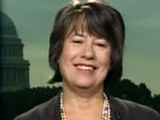 An excellent article by Floyd Norris in the New York Times today. He points out that banks are failing at an alarming rate not because of exotic derivative investments but simply because they made bad loans.
An excellent article by Floyd Norris in the New York Times today. He points out that banks are failing at an alarming rate not because of exotic derivative investments but simply because they made bad loans.
Banks are now losing money and going broke the old-fashioned way: They made loans that will never be repaid.
As the number of banks closed by the Federal Deposit Insurance Corporation has grown rapidly this year, it has become clear that the vast majority of them had nothing to do with the strange financial products that seemed to dominate the news when the big banks were nearing collapse and being bailed out by the government.
There were no C.D.O’s, or S.I.V.’s or AAA-rated “supersenior tranches” that turned out to have little value. Certainly there were no “C.D.O.-squareds.”
Staying away from strange securities has not made things better. Jim Wigand, the F.D.I.C.’s deputy director of resolutions and receiverships, says he expects this wave of failures to be worse for the bank insurance fund than the last big wave of failures, from the savings and loan crisis. He measures that by comparing the amount of expected F.D.I.C. losses to the assets of the failed banks. In some deals this year, the agency expects losses to top 50 percent of assets.
Norris points out that many of the failed banks were victims, so to speak, of their own success. Success stories that grew often through an ever expanding portfolio of construction and commercial real estate loans. As loan portfolios grew and performed well it became a signal to their managements to continue to pile on the assets. If a little was good then a lot was better. Nothing was going wrong so presumably nothing ever would go wrong.
Here is how Norris concludes his article:
Two years ago, when the subprime mortgage problems began to surface, Washington took great comfort from solid balance sheets. “Over all, the banking system is in very good shape,” Sheila C. Bair, the F.D.I.C. chairwoman, said in an interview on CNBC. “They’re very well capitalized, well diversified.”
Last year, we learned that the regulators, like the bankers, did not comprehend the risks of some of the exotic instruments dreamed up by financial engineers. This year we are learning that the regulators, like the bankers, also failed to understand the risks of the generous loans that the banks were making in the middle of this decade.
I take away from this something more or at least different then Norris. Take a look at that statement by Sheila Bair. Sure she was just echoing the party line and trying to not yell fire in a crowded theater but the statement about diversification sticks out like a sore thumb.
The problem that we now face with the smaller banks is that they weren’t diversified. They loaded up on all manner of commercial real estate loans during the decade and now the bill is coming due. Regulation 101, Chapter 1 is that there is nothing so dangerous in lending as a concentration of risk. The numbers were not hidden, they were obvious, yet for over 10 years nothing was apparently done to curb the excess.
Norris says the regulators failed to understand the exotics and also failed to understand the lending risks. Nothing could be further from the truth unless Sheila Bair and all of her cohorts are complete idiots, which for the record I don’t believe. They knew the risks that the banks were running and chose for whatever reason to ignore them. Why they made that decision is what we need to know.
There is a great object lesson here about regulation. No matter how intricate and well thought out the scheme for overseeing banks might be, if regulators choose not to act or are disuaded from acting through political pressure then the exercise is useless. In that light maybe we should be spending less time discussing who gets to regulate what and more making sure that whatever the structure it is robustly employed.
- Bulenox: Get 45% to 91% OFF ... Use Discount Code: UNO
- Risk Our Money Not Yours | Get 50% to 90% OFF ... Use Discount Code: MMBVBKSM
Disclaimer: This page contains affiliate links. If you choose to make a purchase after clicking a link, we may receive a commission at no additional cost to you. Thank you for your support!


Leave a Reply